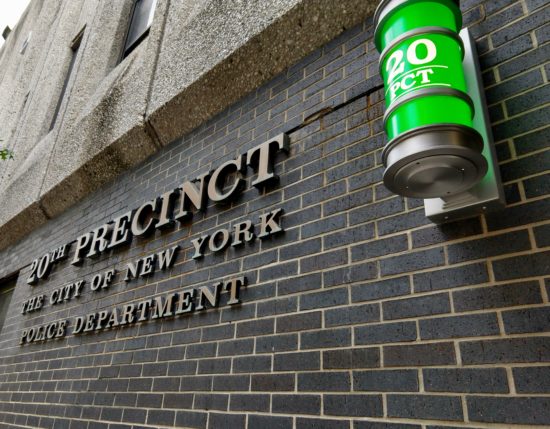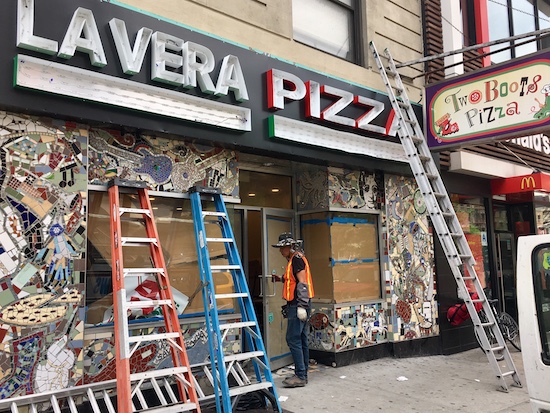
By Joy Bergmann
Nobody wants to have a reason to be at the 20th Precinct during the wee hours. But should you find yourself there, you’re more likely to be greeted by police administrative aide Yvonne Boyce than a uniformed officer. She’s worked midnights – what NYPD folks call the overnight shift – since 2007.
Her deft people skills came to our attention a few months ago at a Community Council meeting. Deputy Inspector Timothy Malin – commanding officer of the 20th – proudly played a taped telephone conversation between Yvonne and a “tester” from NYPD (think: secret shoppers for policing).
The tester’s ruse? His mother had no heat in her apartment and wanted to speak with police about it, but she would need a Haitian Creole translator. Could one be provided?
Yvonne gave the right answer – yes, translators are available 24/7 – but didn’t stop there. She was concerned about the elderly woman and proceeded to coax the man to take action to remedy the situation, becoming a compendium of resources. Did he file a complaint with 311? Contact Con Ed? Call the City Dept of Aging? Helen Rosenthal’s office? CB7? She wouldn’t hang up until she was sure he had a plan. Gently relentless she was. And is.
“She is the very first point of contact for people in need, so having somebody that is caring and compassionate for that role is critical,” says Malin. “She’s exactly the right person. She understands the importance of empathizing with people and delivering high quality customer service. [She’s] a treasure as far as I am concerned.”
WSR wanted to know more about this beacon in the night. A Brooklyn-born grandmother who earned her John Jay College of Criminal Justice bachelor’s and master’s degrees during midlife.
We recently spent a midnight hour at the precinct. Over some vending machine Lorna Doones, Yvonne shared her curiosity about human motivation, her work ethic and her belief in karma.
This interview has been edited for length and clarity.
***
WSR: Have you always worked around policing?
YB: No, I spent 28 years as an administrative assistant on Wall Street with multiple banks. But when you get a certain age on Wall Street, you get laid off.
WSR: How’d you make the switch?
YB: I’d always had a passion for criminal justice. Right before I got my walking papers, I was due to graduate with my Bachelor’s from John Jay.
WSR: Were you considering becoming a cop?
YB: No, 35 is the age cutoff for new cops to be sworn in. I realized a long time ago that 99 percent of the satisfaction of education is self-satisfaction. But I also discovered there are so many facets in the agency [NYPD].
WSR: You aced the civil service test.
YB: I was told I got the second highest score. The only reason why I didn’t get the top is because I didn’t have transferable military credits.
WSR: So you’re a sworn NYPD civilian employee. You took the honor pledge…
YB: Correct. I don’t wear a uniform, and I’m not licensed to carry a weapon. But I have to abide by the same rules and regulations as a uniformed member.
WSR: Did you get any flack when you decided to work for the NYPD?
YB: They tell you in the academy, ‘you’re gonna lose friends.’ When you work in law enforcement, your life changes forever. You cannot do certain things. You cannot associate with certain people. Plain and simple.
WSR: What do you think people get wrong about the police?
YB: I think everything in life is an individual thing. You can’t take a brush and say everybody is one way.
WSR: Personal responsibility is major for you.
YB: Always. You pride yourself with your reflection of who you are.
WSR: Your work ethic is legendary.
YB: I’ve always felt that if you can get up and your limbs are working, you can get up and go to work. I have 10 years of perfect attendance; when I got sick and had to go to the hospital, I used vacation time.

WSR: It’s a stressful moment for people when they come here. They’ve either been victimized by crime or been caught committing it. Do you get into a lot of heavy conversations?
YB: People find me easy to bare their soul to. But you don’t know how a person has gotten there. I’ve heard things that will be forever ingrained in my spirit. I’m grateful that I chose not to walk a certain role.
WSR: It’s such a puzzle why people choose their paths.
YB: Yes, what is it with you and I that we’ve never been to jail? Do some of us find it easier to make certain decisions? That temptation doesn’t impress us?
I always felt when anybody comes into this world, there is nothing of a criminal nature ingrained in your brain and in your spirit. What happens along the way?
WSR: What’s your theory?
YB: Family has a lot to do with it. But I don’t know if I believe that all the time because I remember meeting somebody who said he basically raised himself. He had nobody.
WSR: What about redemption? Can offenders change their ways?
YB: Two stories about that.
I remember an individual came to the window a couple of years back wanting to see one of the officers. He’d written a letter actually thanking the officer for arresting him because it was a wake-up call and he had to change.
Another time, I’d ridden this same bus with this bus driver for a while. And he said to me that he was in jail for 20 years for murder.
WSR: Whoa.
YB: MTA has a program that if you have done your time, and you are not presently on parole or probation, you can have a job. And I commend them for that. There is hope at the end of the tunnel if you want to turn your life around.
But a simple thing in life: karma doesn’t make mistakes. The choices that you make – regardless if the neighborhood is not up to par, regardless if the school is not up to par – are you willing to accept what happens when karma comes your way?
WSR: It’s a values thing, right?
YB: Karma doesn’t make mistakes. I may be able to sit here and give you the best lie and cover it and sugarcoat it, but at the end of the day, if you’re faith-based, you know you reap what you sow. Karma is not religious-based. It’s been around since the beginning of time. Karma eventually knocks at your door.
WSR: What’s your favorite thing about this job?
YB: I like helping individuals. I like one-on-one, to be able to make an impression on someone. My purpose is to treat everybody the way you want to be treated.
WSR: You won’t tell me your age, but how long do you want to keep doing this?
YB: I haven’t considered that only because I’m like a free spirit now.
WSR: You’ve gotta admit it’s unusual for someone to start a law enforcement career later in life.
YB: I remember somebody saying to me, ‘In life, we all have unfinished symphonies.’ And it behooves you to maybe complete some of that.
WSR: Thanks for taking time to play some of yours for us.
YB: You’re walking home? It’s late! Promise me you’ll call me when you get home and you’re safe?
WSR: OK! OK! What number do I call…?









I believe it’s called the Graveyard shift..
Wow. Amazing woman. I am inspired by her. Imagine the countless lives she’s touched in positive ways.
Thank you, Joy Bergmann, for sharing a nice story about a good person who is essentially working for all of us Westsiders to make it a better safer place. I hope you called her when you got home!
And thank you, Yvonne, you’re the greatest and an inspiration to all!
I heard the full telephone conversation played on tape – at the 20th Precinct Community Board Meeting earlier this year, and it is extraordinary. Yvonne Boyce responded to each query and then provided more helpful information.
props to Yvonne BOyce, and Joy Bergmann for the interview. It would be great if WSR did interviews / profiles of some other public servants/ public employees in the area. Most NYC public employees from all agencies are hard working, underpaid, and dedicated to their jobs. (We do get good benefits.) too many people like to disparage public employees. UFT, Health + Hospitals, FDNY, NYPD, MTA, AFSCME: they (we) keep the city running.
Props to DI Malin for highlighting Yvonne’s work. What she does is true “community policing”: treating social problems holistically. Stopping crime is not all about slamming handcuffs on people and putting them in jail.
Loveliness!
Miss Boyce has always been helpful, concerned and proactive.
It is a Pleasure to see a City employee portrayed in a positive way. We are often seen as bitter, lazy employees which deters others from seeking help.
This article was SO enlightening, thanks WSR.